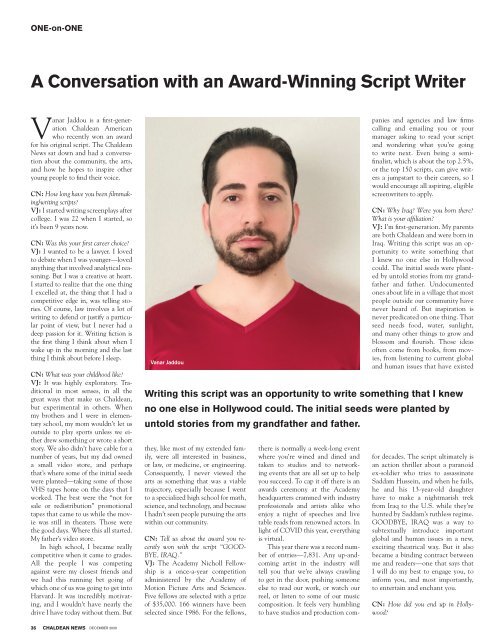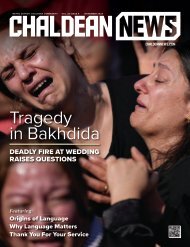DECEMBER 2020
Create successful ePaper yourself
Turn your PDF publications into a flip-book with our unique Google optimized e-Paper software.
ONE-on-ONE<br />
A Conversation with an Award-Winning Script Writer<br />
Vanar Jaddou is a first-generation<br />
Chaldean American<br />
who recently won an award<br />
for his original script. The Chaldean<br />
News sat down and had a conversation<br />
about the community, the arts,<br />
and how he hopes to inspire other<br />
young people to find their voice.<br />
CN: How long have you been filmmaking/writing<br />
scripts?<br />
VJ: I started writing screenplays after<br />
college. I was 22 when I started, so<br />
it’s been 9 years now.<br />
CN: Was this your first career choice?<br />
VJ: I wanted to be a lawyer. I loved<br />
to debate when I was younger—loved<br />
anything that involved analytical reasoning.<br />
But I was a creative at heart.<br />
I started to realize that the one thing<br />
I excelled at, the thing that I had a<br />
competitive edge in, was telling stories.<br />
Of course, law involves a lot of<br />
writing to defend or justify a particular<br />
point of view, but I never had a<br />
deep passion for it. Writing fiction is<br />
the first thing I think about when I<br />
wake up in the morning and the last<br />
thing I think about before I sleep.<br />
CN: What was your childhood like?<br />
VJ: It was highly exploratory. Traditional<br />
in most senses, in all the<br />
great ways that make us Chaldean,<br />
but experimental in others. When<br />
my brothers and I were in elementary<br />
school, my mom wouldn’t let us<br />
outside to play sports unless we either<br />
drew something or wrote a short<br />
story. We also didn’t have cable for a<br />
number of years, but my dad owned<br />
a small video store, and perhaps<br />
that’s where some of the initial seeds<br />
were planted—taking some of those<br />
VHS tapes home on the days that I<br />
worked. The best were the “not for<br />
sale or redistribution” promotional<br />
tapes that came to us while the movie<br />
was still in theaters. Those were<br />
the good days. Where this all started.<br />
My father’s video store.<br />
In high school, I became really<br />
competitive when it came to grades.<br />
All the people I was competing<br />
against were my closest friends and<br />
we had this running bet going of<br />
which one of us was going to get into<br />
Harvard. It was incredibly motivating,<br />
and I wouldn’t have nearly the<br />
drive I have today without them. But<br />
Vanar Jaddou<br />
they, like most of my extended family,<br />
were all interested in business,<br />
or law, or medicine, or engineering.<br />
Consequently, I never viewed the<br />
arts as something that was a viable<br />
trajectory, especially because I went<br />
to a specialized high school for math,<br />
science, and technology, and because<br />
I hadn’t seen people pursuing the arts<br />
within our community.<br />
CN: Tell us about the award you recently<br />
won with the script “GOOD-<br />
BYE, IRAQ.”<br />
VJ: The Academy Nicholl Fellowship<br />
is a once-a-year competition<br />
administered by the Academy of<br />
Motion Picture Arts and Sciences.<br />
Five fellows are selected with a prize<br />
of $35,000. 166 winners have been<br />
selected since 1986. For the fellows,<br />
there is normally a week-long event<br />
where you’re wined and dined and<br />
taken to studios and to networking<br />
events that are all set up to help<br />
you succeed. To cap it off there is an<br />
awards ceremony at the Academy<br />
headquarters crammed with industry<br />
professionals and artists alike who<br />
enjoy a night of speeches and live<br />
table reads from renowned actors. In<br />
light of COVID this year, everything<br />
is virtual.<br />
This year there was a record number<br />
of entries—7,831. Any up-andcoming<br />
artist in the industry will<br />
tell you that we’re always crawling<br />
to get in the door, pushing someone<br />
else to read our work, or watch our<br />
reel, or listen to some of our music<br />
composition. It feels very humbling<br />
to have studios and production companies<br />
and agencies and law firms<br />
calling and emailing you or your<br />
manager asking to read your script<br />
and wondering what you’re going<br />
to write next. Even being a semifinalist,<br />
which is about the top 2.5%,<br />
or the top 150 scripts, can give writers<br />
a jumpstart to their careers, so I<br />
would encourage all aspiring, eligible<br />
screenwriters to apply.<br />
CN: Why Iraq? Were you born there?<br />
What is your affiliation?<br />
VJ: I’m first-generation. My parents<br />
are both Chaldean and were born in<br />
Iraq. Writing this script was an opportunity<br />
to write something that<br />
I knew no one else in Hollywood<br />
could. The initial seeds were planted<br />
by untold stories from my grandfather<br />
and father. Undocumented<br />
ones about life in a village that most<br />
people outside our community have<br />
never heard of. But inspiration is<br />
never predicated on one thing. That<br />
seed needs food, water, sunlight,<br />
and many other things to grow and<br />
blossom and flourish. Those ideas<br />
often come from books, from movies,<br />
from listening to current global<br />
and human issues that have existed<br />
Writing this script was an opportunity to write something that I knew<br />
no one else in Hollywood could. The initial seeds were planted by<br />
untold stories from my grandfather and father.<br />
for decades. The script ultimately is<br />
an action thriller about a paranoid<br />
ex-soldier who tries to assassinate<br />
Saddam Hussein, and when he fails,<br />
he and his 13-year-old daughter<br />
have to make a nightmarish trek<br />
from Iraq to the U.S. while they’re<br />
hunted by Saddam’s ruthless regime.<br />
GOODBYE, IRAQ was a way to<br />
subtextually introduce important<br />
global and human issues in a new,<br />
exciting theatrical way. But it also<br />
became a binding contract between<br />
me and readers—one that says that<br />
I will do my best to engage you, to<br />
inform you, and most importantly,<br />
to entertain and enchant you.<br />
CN: How did you end up in Hollywood?<br />
36 CHALDEAN NEWS <strong>DECEMBER</strong> <strong>2020</strong>

















